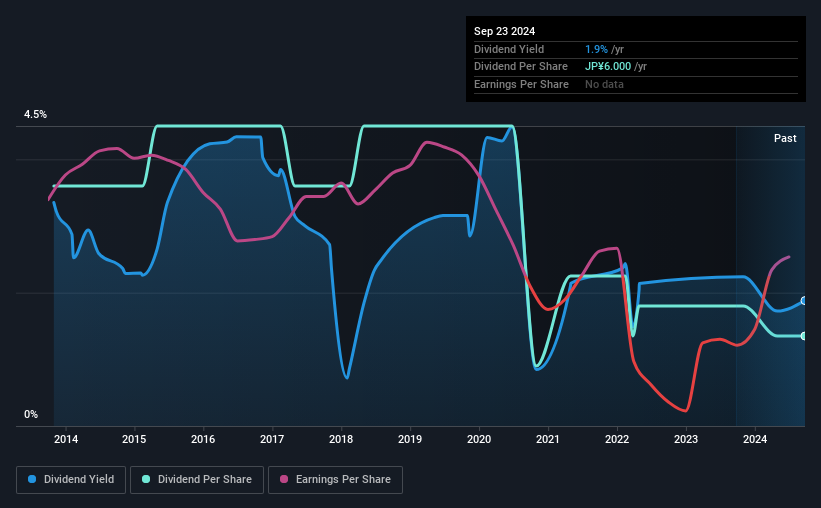It Might Not Be A Great Idea To Buy Nichidai Corporation (TSE:6467) For Its Next Dividend

Some investors rely on dividends for growing their wealth, and if you're one of those dividend sleuths, you might be intrigued to know that Nichidai Corporation (TSE:6467) is about to go ex-dividend in just 3 days. Typically, the ex-dividend date is one business day before the record date which is the date on which a company determines the shareholders eligible to receive a dividend. The ex-dividend date is an important date to be aware of as any purchase of the stock made on or after this date might mean a late settlement that doesn't show on the record date. Meaning, you will need to purchase Nichidai's shares before the 27th of September to receive the dividend, which will be paid on the 2nd of December.
The company's next dividend payment will be JP¥2.00 per share, on the back of last year when the company paid a total of JP¥6.00 to shareholders. Based on the last year's worth of payments, Nichidai has a trailing yield of 1.9% on the current stock price of JP¥319.00. We love seeing companies pay a dividend, but it's also important to be sure that laying the golden eggs isn't going to kill our golden goose! So we need to check whether the dividend payments are covered, and if earnings are growing.
Check out our latest analysis for Nichidai
Dividends are typically paid out of company income, so if a company pays out more than it earned, its dividend is usually at a higher risk of being cut. Nichidai paid out a comfortable 39% of its profit last year. That said, even highly profitable companies sometimes might not generate enough cash to pay the dividend, which is why we should always check if the dividend is covered by cash flow. It paid out 92% of its free cash flow in the form of dividends last year, which is outside the comfort zone for most businesses. Companies usually need cash more than they need earnings - expenses don't pay themselves - so it's not great to see it paying out so much of its cash flow.
Nichidai paid out less in dividends than it reported in profits, but unfortunately it didn't generate enough cash to cover the dividend. Were this to happen repeatedly, this would be a risk to Nichidai's ability to maintain its dividend.
Click here to see how much of its profit Nichidai paid out over the last 12 months.

Have Earnings And Dividends Been Growing?
Companies with falling earnings are riskier for dividend shareholders. Investors love dividends, so if earnings fall and the dividend is reduced, expect a stock to be sold off heavily at the same time. Nichidai's earnings per share have plummeted approximately 32% a year over the previous five years.
The main way most investors will assess a company's dividend prospects is by checking the historical rate of dividend growth. Nichidai has seen its dividend decline 9.3% per annum on average over the past 10 years, which is not great to see. It's never nice to see earnings and dividends falling, but at least management has cut the dividend rather than potentially risk the company's health in an attempt to maintain it.
The Bottom Line
From a dividend perspective, should investors buy or avoid Nichidai? Nichidai's earnings per share have fallen noticeably and, although it paid out less than half its profit as dividends last year, it paid out a disconcertingly high percentage of its cashflow, which is not a great combination. With the way things are shaping up from a dividend perspective, we'd be inclined to steer clear of Nichidai.
Having said that, if you're looking at this stock without much concern for the dividend, you should still be familiar of the risks involved with Nichidai. Every company has risks, and we've spotted 3 warning signs for Nichidai (of which 1 doesn't sit too well with us!) you should know about.
If you're in the market for strong dividend payers, we recommend checking our selection of top dividend stocks.
Valuation is complex, but we're here to simplify it.
Discover if Nichidai might be undervalued or overvalued with our detailed analysis, featuring fair value estimates, potential risks, dividends, insider trades, and its financial condition.
Access Free AnalysisHave feedback on this article? Concerned about the content? Get in touch with us directly. Alternatively, email editorial-team (at) simplywallst.com.
This article by Simply Wall St is general in nature. We provide commentary based on historical data and analyst forecasts only using an unbiased methodology and our articles are not intended to be financial advice. It does not constitute a recommendation to buy or sell any stock, and does not take account of your objectives, or your financial situation. We aim to bring you long-term focused analysis driven by fundamental data. Note that our analysis may not factor in the latest price-sensitive company announcements or qualitative material. Simply Wall St has no position in any stocks mentioned.
About TSE:6467
Nichidai
Develops, manufactures, and sells precision-forged dies and related forged products in Japan and internationally.
Flawless balance sheet with questionable track record.


